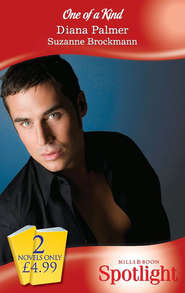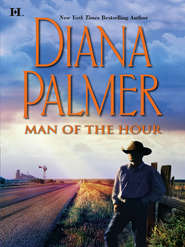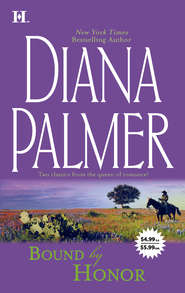По всем вопросам обращайтесь на: info@litportal.ru
(©) 2003-2024.
✖
Diana Palmer Christmas Collection: The Rancher / Christmas Cowboy / A Man of Means / True Blue / Carrera's Bride / Will of Steel / Winter Roses
Автор
Год написания книги
2018
Настройки чтения
Размер шрифта
Высота строк
Поля
“I guess so.” She savored the last of the beef. “It’s really good.”
“Beats eating pigs,” he remarked, and grinned.
She burst out laughing. “Your brother Cag had plenty to say on that subject.”
“He only eats beef or fish. He won’t touch anything that comes from a pig. He says it’s because he doesn’t like the taste.” He leaned forward conspiratorially. “But I say it’s because of that movie he went to see. He used to love a nice ham.”
“What movie?”
“The one with the talking pig.”
“Cag went to see that?”
“He likes cartoons and sentimental movies.” He shrugged. “Odd, isn’t it? He’s the most staid of us. To look at him, you’d never know he had a sense of humor or that he was sentimental. He’s like the others in his lack of conventional good looks, though. Most women can’t get past that big nose and those eyes.”
“A cobra with a rabbit,” she said without thinking.
He chuckled. “Exactly.”
“Does he hate women as much as the rest of you?”
“Hard to tell. You haven’t seen him in a tuxedo at a social bash. Women, really beautiful women, followed him around all night dropping their room keys at his feet.”
“What did he do?”
“Kept walking.”
She put down her fork. “What do you do?”
He smiled mockingly. “They don’t drop room keys at my feet anymore. The limp puts them off.”
“Baloney,” she said. “You’re the handsomest of the four, and it isn’t just looks.”
He leaned back in his chair to look at her. His eyes narrowed thoughtfully. “Does the limp bother you?”
“Don’t be ridiculous,” she said, lifting her gaze. “Why should it?”
“I can’t dance very well anymore.”
She smiled. “I don’t ever go to dances.”
“Why not?”
She sipped coffee. “I don’t like men touching me.”
His eyes changed. “You like me touching you.”
“You aren’t a stranger,” she said simply.
“Maybe I am,” he murmured quietly. “What do you know about me?”
She stared at him. “Well, you’re thirty-six, you’re a rancher, you’ve never married, you come from San Antonio.”
“And?”
“I don’t know any more than that,” she said slowly.
“We were a couple for several weeks before you left town. Is that all you learned?”
“You were always such a private person,” she reminded him. “You never talked about yourself or your brothers. And we never really talked that much when we were together.”
“We spent more time kissing,” he recalled. “I was too wrapped up in trying to get you into bed to care how well we knew each other,” he said with selfcontempt. “I wasted a lot of time.”
“You said that we shouldn’t look back.”
“I’m trying not to. It’s hard, sometimes.” He moved forward to take her hands under his on the table. “I like classical music, but I’m just as happy with country or pop. I like a good chess game. I enjoy science fiction movies and old Westerns, the silent kind. I’m an early riser, I work hard and I don’t cheat on my tax returns. I went to college to learn animal husbandry, but I never graduated.”
She smiled. “Do you like fried liver?”
He made a horrible face. “Do you?”
She made the same face. “But I don’t like sweets very much, either,” she said, remembering that he didn’t.
“Good thing. Nobody around here eats them.”
“I remember.” She looked around at the comfortably big kitchen. There was a new electric stove and a huge refrigerator, flanked by an upright freezer. The sink was a double stainless-steel one, with a window above it overlooking the pasture where the colts were kept. Next to that was a dishwasher. There was plenty of cabinet space, too.
“Like it?” he asked.
She smiled. “It’s a dream of a kitchen. I’ll bet Mrs. Culbertson loves working in here.”
“Would you?”
She met his eyes and felt her own flickering at the intensity of his stare.
“If you can make homemade bread, you have to be an accomplished cook,” he continued. “There’s a high-tech mixer in the cabinet, and every gourmet tool known to man. Or woman.”
“It’s very modern.”
“It’s going to be very deserted in about three weeks,” he informed.
“Why is Mrs. Culbertson quitting?”
“Her husband has cancer, and she wants to retire and stay at home with him, for as long as he’s got,” he said abruptly. He toyed with his coffee cup. “They’ve been married for fifty years.” He took a sharp breath, and his eyes were very dark as they met hers. “I’ve believed all my life that no marriage could possibly last longer than a few years. People change. Situations change. Jobs conflict.” He shrugged. “Then Mrs. Culbertson came here to work, with her husband. And I had to eat my words.” He lowered his eyes back to the cup. “They were forever holding hands, helping each other, walking in the early morning together and talking. She smiled at him, and she was beautiful. He smiled back. Nobody had to say that they loved each other. It was obvious.”
“My parents were like that,” she recalled. “Dad and Mom loved each other terribly. When she died, I almost lost him, too. He lived for me. But the last thing he said on his deathbed—” she swallowed, fighting tears “—was her name.”
He got up from the table abruptly and went to the window over the sink. He leaned against it, breathing heavily, as if what she’d said had affected him powerfully. And, in fact, it had.











